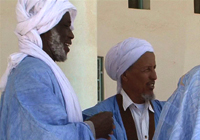Who Celebrates the World Day?
World Day activities in Mauritania
Activity Recap
In Mauritania, Day of Prayer and Action for Children activities were organized in partnership with UNICEF, the Ministry of Social Affairs, Childhood and Family, the Child Rights Forum, the Regional Movements for Children and the Imams Network for Child Rights. The Minister of Social Affairs and the UNICEF Representative presided over a ceremony to distribute equipment to early childhood services and to present a fatwa (a religious decree) forbidding violence against children. Five Regional Movements for Children and the main Wilayas (Regions) also organized awareness-raising sessions focusing on non-violent forms of disciplining. See http://www.unicef.org/infobycountry/mauritania_60765.html
Religious leaders reinforce their commitment to ending violence against children in Mauritania
By Laurent Prieur
NOUAKCHOTT, Mauritania 29 November 2011 – In Mauritania, corporal punishment has long been the norm not only in Madrassas (Qur’anic schools) and non-religiously affiliated primary schools, but also in the home. It is considered an effective way to enforce discipline.
In response to this widespread violence against children, and given the key position of religious leaders in the country, UNICEF Mauritania determined that a partnership with the Imams and Religious Leaders Network for Child Rights would be the best way to challenge the practice. The network is headed by Hademine Ould Saleck who, as Imam of the Nouakchott Ibn Abass Mosque and a teacher since 1975, has a long history of fighting violence against children.
Ground-breaking fatwa
The network undertook a study of the Qur’an and the Islamic legal system to determine whether Islam permits corporal punishment. The study shows that Islamic law (Sharia) protects the physical integrity of children. It concluded that violence has no place in Islam and provided the basis for a fatwa (a religious opinion on how questions related to Islamic law should be understood, interpreted or applied) that forbids verbal and physical violence in the educational system.
After the fatwa was officially proclaimed, UNICEF and the network distributed more than 2,000 copies and organized a number of workshops across the country.
“This fatwa has been a very important landmark for the communities here in Mauritania and has been distributed to more than two thousand schools and religious centres in the country,’’ said Lucia Elmi UNICEF Representative.
Signs of behaviour change
Despite the long tradition of corporal punishment in the educational system, most of the teachers who attended the workshops were convinced by the religious opinion.
“The imams and those in charge of the Madrassas who read the fatwa have acknowledged that its content is completely in agreement with the teachings of Islam,” said Hademine Ould Saleck. “Most of them agreed to stop corporal punishment and follow the teaching recommendations of the fatwa.”
Cheikh (religious official) Mohamed Lemine, works in a Qur’anic school in a suburb of Nouakchott described the turnaround after the implementation of the fatwa. “Before, we used to have whips. When the children disobeyed we would hit them when we needed to; whatever happened, if they ran away or hid, that was what we did,” he said. “Now we are working in a new way, which is more productive, and we thank God for this new approach.”
Encouraging results
While more time is needed to measure the exact impact of the fatwa, several positive changes are already clear: The number of students has risen and teachers are increasingly using non-violent methods to maintain order.
“Since the fatwa, we are calmer and more receptive and we can concentrate better,” said Mohamed, a 15-year-old student at the Madrassa where Cheikh Mohamed Lemine teaches.
His mother Fatimetou, who has four other children attending the same school, has also noticed the beneficial effects of the new methods. “When the children come home, they are calmer and they remember what they have learned,” she said. “They want to go back to the mahadra the next day because it is now a peaceful place for them.”
The fatwa was recently highlighted at a ceremony presided over by the Minister of Social Affairs and the UNICEF Representative to commemorate the third annual World Day of Prayer and Action for Children. Awareness-raising sessions that focused on further reducing corporal punishment were also held in the different regions of the country. The network, UNICEF and other partners plan to continue their successful collaboration to protect children’s rights in Mauritania.
Keywords: UNICEF, government, violence against children, positive parenting, Islam, faith based organization, FBO, UN Agency
